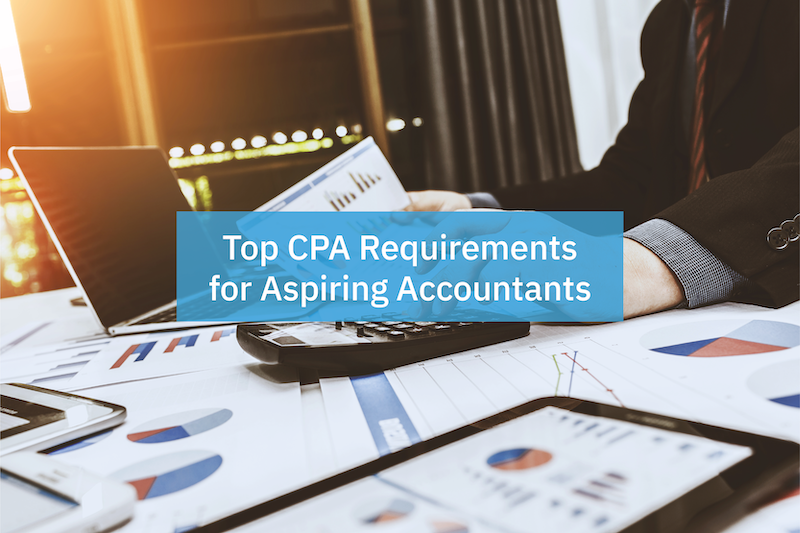
Passing the Certified Public Accountant (CPA) exam is NOT the only requirement for becoming a CPA. There are actually many more steps. Let’s take a closer look at the CPA requirements you will need in order to become a CPA.

Becoming a CPA
Each of the 55 license-granting jurisdictions (the 50 states plus Washington, DC, Guam, Puerto Rico, the Virgin Islands, and the Mariana Islands) maintains its own CPA license requirements. While you’ll have to meet CPA requirements for the jurisdiction you wish to be licensed in, here are some overarching requirements.
Educational CPA Requirements
All 50 states require a bachelor’s degree with at least 150 credit hours of coursework to become a licensed CPA. Some states will let you sit for the CPA Exam with 120 hours of study. However, you must complete 150 hours before you can apply for a license. These states are referred to as two-tier states. Each state also specifies how many hours of accounting studies you need as part of their CPA Exam requirements.
Here’s an example: The state of Alabama requires 150 semester hours. Those hours can consist of:
- 22 hours in upper-level accounting courses
- 27 hours in businesses courses other than accounting in subjects like economics, business law, marketing, and other relevant business courses
Age CPA Requirements
Most states and territories don’t have a minimum age for taking the CPA exam. Those that do though, set the minimum age to 18. In New York and Missouri, you must be 21to be eligible for a CPA license.
Residency CPA Requirements
While most states allow nonresidents to take the CPA Exam, some require you to be a resident for at least six months. This can be fulfilled by having a residence, business location, or have regular employment within the state.
Top Accounting Skills Needed
To achieve official CPA requirements, practical skills are also needed. If you’re thinking about becoming a CPA, here are top accounting skills outlined by professional CPAs.
-
Analytical Skills
Accounting requires a meticulous, detail-oriented eye. Accountants must sift through financial records to ensure data is accurate and current or else it will lead to inconsistent results. “The best accountants can look at an analysis report and quickly determine whether or not the facts and figures compute,” says Bob Prather, general manager of accounting and finance recruiting for Lucas Group.
-
Organization
Accountants must be highly organized in order to successfully manage multiple clients, meet deadlines, and follow reporting guidelines. Logan Allec, current CPA, explains that “If you want to be an organizational master when you embark on your accounting career, you’ll need to start working on organizing your responsibilities and life now.”
-
Flexibility
The ability to multitask and adapt to individual clients and projects is critical. CPA Kyle Bryant also emphasizes that time management is essential for successful accounting careers. He states, “Working on different projects and being able to manage deadlines is a trait that separates passable accountants from their top-shelf peers.”
-
Industry Knowledge
According to Bob Prather, accountants should have extensive knowledge about financial statements and how they work. Technical expertise in specialized areas of finance can also create a niche for new CPAs. However, CPAs still need a wide breadth of knowledge for multiple areas of financial management, analysis, and tax regulations. For example, general ledger and standard reconciliation skills serve all facets of accounting. Prather also urges accountants to also sharpen their understanding of Generally Accepted Accounting Principles (GAAP), Securities and Exchanges Commission reporting, and initial public offerings.
These are only a few of the skills that accountants should master for a career in accounting. If you’re interested in learning more about the other CPA requirements that are handy, check out this article here on accounting.com.
Learn the Latest Accounting Technology
Another major CPA requirement for the modern accountant is knowledge of the latest in accounting technology. If you’re a CPA and struggling with spreadsheets, it’s time to leave them behind – they’re already outdated. Instead, embrace cloud-based automated accounting systems like Accounting Seed. Leading the industry in flexible, automated accounting, and intuitive reporting features, Accounting Seed helps you transform your business with faster, more reliable accounting.
A native Salesforce accounting platform, Accounting Seed, provides a full 360-degree view of your business’ performance to make the best decisions possible. This is an accounting solution developed by and for accountants.
See Accounting Seed in action
Get a close-up view of how accounting on Salesforce can eliminate the need for costly integrations—and silos of mismatched information—by sharing the same database as your CRM.



